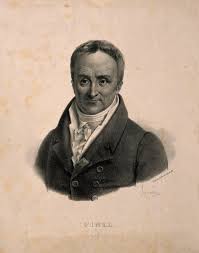Celebrating the life of Philippe Pinel, “Father of modern psychiatry.”

Philippe Pinel (1745-1826) was an early neuropsychiatrist who advocated for improved care of people with mental illness. He died on 25 October 1826. He was also one of the pioneers of the French Revolution.
Today marks the anniversary of the death of Philippe Pinel, a name that stands tall in the history of mental health care. Dying on October 25, 1826, Pinel left behind an enduring legacy as the founder of modern psychiatry and an early advocate for treating those with mental illness with humanity and respect. He was not only a physician but a revolutionary thinker whose compassion changed the way we view and care for people with mental health conditions such as anxiety and depression, schizophrenia, and bipolar disorder.
Pinel’s story is especially significant when we look back at how mental health was understood in the 18th century. At a time when people with mental illnesses were often confined in chains and treated like criminals, Pinel challenged these practices. In 1793, during the French Revolution, he famously ordered the unchaining of patients at the Bicêtre Hospital in Paris, a symbolic act that underscored his belief in humane treatment and the need for moral care in psychiatry. This shift in thinking paved the way for more understanding of conditions like post-traumatic stress disorder (PTSD), psychosis, and bulimia and other eating disorders—all of which benefit from compassionate and thoughtful treatment today.
Why is Philippe Pinel still celebrated today?
Pinel’s ideas were groundbreaking for his time, advocating for more than just physical treatment of mental illness. He believed in understanding the individual behind the illness, emphasizing the importance of listening to patients and recognizing their dignity. This approach laid the foundation for what we now call modern psychotherapy. His work sparked an international movement toward more compassionate and ethical care for those struggling with mental health conditions. Today, his principles guide treatment approaches for common mental health challenges such as anxiety, depression, and severe conditions like schizophrenia and bipolar disorder.
If you’re interested in learning more about mental health treatment options for these conditions, you can find reliable information from sources such as the American Psychiatric Association or National Alliance on Mental Illness (NAMI, both of which provide up-to-date resources and guides on mental health care.
For those who are dealing with these conditions today, Pinel’s work resonates strongly. His revolutionary views laid the groundwork for the ethical treatment of mental health patients, something that is still evolving but remains rooted in his principles of empathy and compassion. According to modern mental health studies, individuals who receive compassionate care tend to show better outcomes and a higher quality of life.
Fast forward to today, and Pinel’s vision is more relevant than ever. As we continue to break down stigmas surrounding mental health, we owe much to the revolutionary principles Pinel set forth centuries ago. His humane approach to treating the mentally ill laid the groundwork for how we now understand and treat disorders like PTSD and eating disorders. Pinel taught us that mental health care must be about more than just treatment—it should be rooted in empathy, understanding, and respect.
At DJS Psychiatry, we honor the legacy of Philippe Pinel by continuing his mission to provide compassionate, patient-centered care. We offer comprehensive support for a wide range of conditions, including anxiety, depression, bipolar disorder, schizophrenia, PTSD, and more. As we reflect on his life’s work, we’re reminded of how far we’ve come and how much further we can go in advancing mental health treatment. Pinel’s work continues to inspire our approach to addressing complex mental health conditions like psychosis and eating disorders, ensuring that all individuals receive the care and respect they deserve.
So, as we remember Philippe Pinel today, let’s take a moment to appreciate the progress we’ve made in mental health care and renew our commitment to providing the best possible care for all individuals. Whether someone is seeking help for anxiety, dealing with the challenges of PTSD, or managing long-term conditions like schizophrenia, Pinel’s principles still guide us.
Let’s continue to build on Pinel’s incredible legacy!
